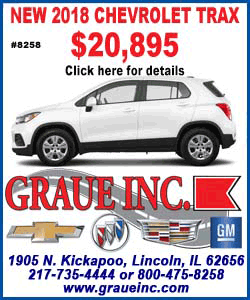|
Automakers warn U.S. tariffs will cost
hundreds of thousands of jobs, hike prices
 Send a link to a friend
Send a link to a friend
 [June 28, 2018]
By David Shepardson [June 28, 2018]
By David Shepardson
WASHINGTON (Reuters) - Two major auto trade
groups on Wednesday warned the Trump administration that imposing up to
25 percent tariffs on imported vehicles would cost hundreds of thousands
of auto jobs, dramatically hike prices on vehicles and threaten industry
spending on self-driving cars.
A coalition representing major foreign automakers including Toyota Motor
Corp, Volkswagen AG <VOWG_p.DE>, BMW AG, and Hyundai Motor Co, said the
tariffs would harm automakers and U.S. consumers. The administration in
May launched an investigation into whether imported vehicles pose a
national security threat and President Donald Trump has repeatedly
threatened to quickly impose tariffs.
"The greatest threat to the U.S. automotive industry at this time is the
possibility the administration will impose duties on imports in
connection with this investigation," wrote the Association of Global
Automakers representing major foreign automakers. "Such duties would
raise prices for American consumers, limit their choices, and suppress
sales and U.S. production of vehicles."

The group added: "Rather than creating jobs, these tariffs would result
in the loss of hundreds of thousands of American jobs producing and
selling cars, SUVs, trucks and auto parts."
On Friday Trump threatened to impose a 20 percent tariff on all imports
of EU-assembled cars. On Tuesday Trump said tariffs are coming soon. "We
are finishing our study of Tariffs on cars from the E.U. in that they
have long taken advantage of the U.S. in the form of Trade Barriers and
Tariffs. In the end it will all even out - and it won't take very long!"
Trump tweeted.
The Alliance of Automobile Manufacturers, representing General Motors
Co, Ford Motor Co, Daimler AG, Toyota and others, urged the
administration in separate comments filed Wednesday not to go forward.
"We believe the resulting impact of tariffs on imported vehicles and
vehicle components will ultimately harm U.S. economic security and
weaken our national security," the group wrote, calling the tariffs a
"mistake" and adding imposing them "could very well set a dangerous
precedent that other nations could use to protect their local market
from foreign competition."
The Alliance said its analysis of 2017 auto sales data showed a 25
percent tariff on imported vehicles would result in an average price
increase of $5,800, which would boost costs to American consumers by
nearly $45 billion annually.
Automakers are concerned tariffs would mean less capital to spend on
self-driving cars and electric vehicles.
"We are already in the midst of an intense global race to lead on
electrification and automation. The increased costs associated with the
proposed tariffs may result in diminishing the U.S.' competitiveness in
developing these advanced technologies," the Alliance wrote.
Toyota said in a statement Wednesday that new tariffs "would increase
the cost of every vehicle sold in the country." The automaker said the
tariffs would mean even a Toyota Camry built in Kentucky "would face
$1,800 in increased costs."
[to top of second column]
|

Audi vehicles sit waiting for delivery after their arrival in the
United States in National City, California, U.S. June 27, 2018.
REUTERS/Mike Blake

Both automotive trade groups cited a study by the Peterson Institute
for International Economics that the cost to U.S. jobs from the
import duties would be 195,000 jobs and could be as high as 624,000
jobs if other countries retaliate.
The German Association for Small and Medium-sized Businesses said
the "pattern of rising protectionism is very likely to continue if
the U.S. decide to impose tariffs on foreign automobiles and
automobile parts, thus causing tremendous damage to both economies."
Alabama Governor Kay Ivey, a state that produced nearly 1 million
vehicles and 1.7 million engines built by foreign automakers last
year, urged the Commerce Department not to invoke the tariffs. She
said job losses from new levies could be "devastating."
The proposed tariffs on national security grounds have been met by
opposition among many Republicans in Congress.
Trump has made the tariffs a key part of his economic message and
repeatedly lamented the U.S auto sector trade deficit, particularly
with Germany and Japan. Some aides have suggested that the effort is
a way to try to pressure Canada and Mexico into making more
concessions in ongoing talks to renegotiate the North American Free
Trade Agreement.
U.S. Commerce Secretary Wilbur Ross said on Thursday the department
aimed to wrap up the probe by late July or August. The Commerce
Department plans to hold two days of public comments in July on its
investigation of auto imports.
The Commerce Department has asked if it should consider U.S. owned
auto manufacturers differently than foreign automakers.

The Association of Global Automakers rejected that contention,
saying its members' American workers "are no less patriotic or
willing to serve their country in a time of crisis than any other
Americans."
The group questioned national security as grounds to restrict auto
imports. "America does not go to war in a Ford Fiesta," they added.
The Alliance said "there is no basis to claim that auto-related
imports are a threat to national security" and noted that 98 percent
of U.S. auto imports came from U.S. national security allies.
(Reporting by David Shepardson; editing by Diane Craft)
[© 2018 Thomson Reuters. All rights
reserved.]
Copyright 2018 Reuters. All rights reserved. This material may not be published,
broadcast, rewritten or redistributed.
Thompson Reuters is solely responsible for this content. |